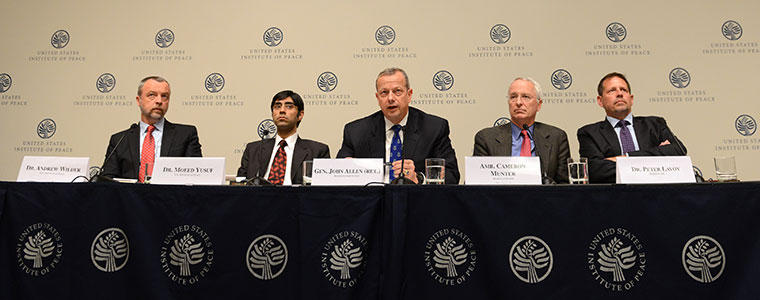Insurgency and Counterinsurgency in Pakistan and the South Asia Region
Read the event coverageThe U.S. Institute of Peace hosted a discussion with key policy experts on counterterrorism and counterinsurgency efforts in Pakistan and the greater South Asia region.

South Asia has experienced excessive and sustained violence over the past decade. India, Pakistan and Afghanistan continue to face major internal insurgencies, while Sri Lanka and Nepal face political turbulence and lingering tensions despite having declared a formal end to their intra-state conflicts.
While there has been a robust international presence and numerous counterterrorism and counterinsurgency efforts, seldom have we broadened the discussion to more fully understand the root causes of insurgencies and the methods used by Pakistan and Afghanistan as well as other South Asian countries to respond to the threat of terror and insurgency.
Reflecting new research from two recently published books, Pakistan’s Counterterrorism Challenge (Georgetown University Press and USIP) and Insurgency and Counterinsurgency in South Asia (USIP Press), USIP hosted a panel discussion on South Asia’s security challenges, with a special focus on Pakistan. Marked by the 2014 transition in Afghanistan, Pakistan’s formal round of peace talks with the Pakistani Taliban, and the launch of Pakistan’s national internal security policy, this moment is a critical turning point for the region and will surely have direct implications for the counterinsurgency efforts there and the violence in neighboring Pakistan. Join the conversation on Twitter with #USIPSAsia.
Featured Speakers:
- Moeed Yusuf
Director, South Asia Programs, U.S. Institute of Peace - General John Allen
Distinguished Fellow, Brookings Institution, and former Commander, International Security Assistance Force (ISAF) - Cameron Munter
Professor of International Relations, Pomona College, former U.S. Ambassador to Pakistan - Peter Lavoy
Partner, Monitor 360, former Assistant Secretary of Defense for Asian and Pacific Security Affairs (APSA) - Andrew Wilder, Moderator
Vice President, South & Central Asia, U.S. Institute of Peace



